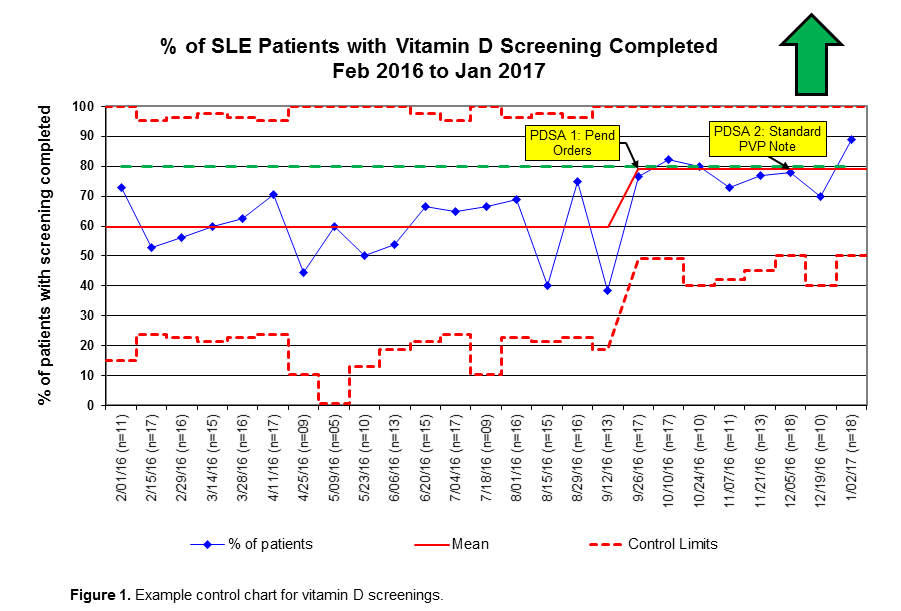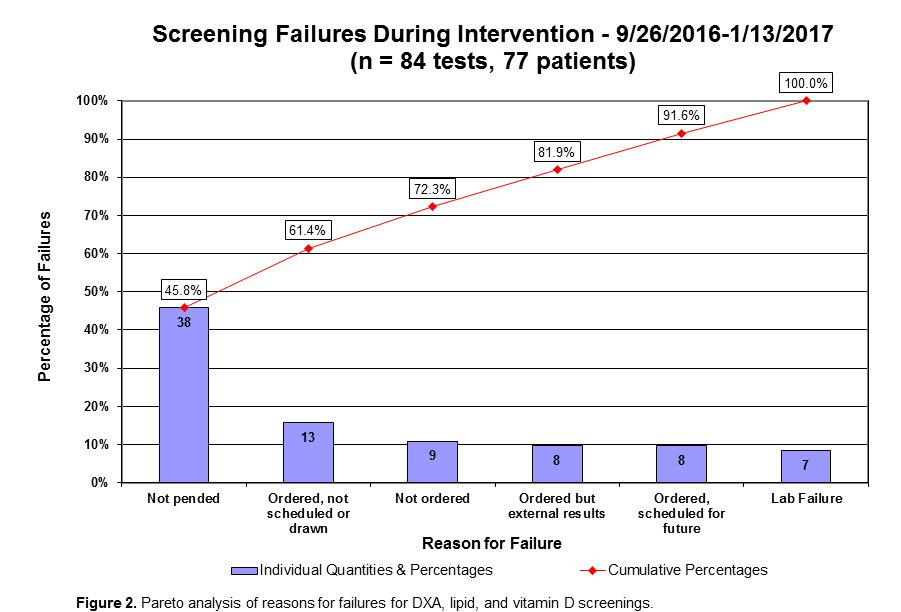Session Information
Date: Thursday, May 18, 2017
Title: Quality, Health Services and Education Research Poster Breakout I
Session Type: Abstract Submissions
Session Time: 4:45PM-5:15PM
Background/Purpose: Childhood-onset SLE (cSLE) leads to poor health outcomes, including cardiovascular and bone health, due to high rates of potentially devastating disease complications and medication toxicities. Initial benchmarking of cSLE quality indicator measures revealed suboptimal performance and significant variation in cardiovascular and bone health processes of care. The aim of this study was to develop a reliable process to improve performance and decrease variability from baseline on bone mineral density testing via dual x-ray absorptiometry (DXA), serum lipid profiles, and serum vitamin D screenings.
Methods: The intervention took place from September 2016 to January 2017 at a tertiary care pediatric rheumatology clinic. Eligible patients with SLE diagnosis code were identified using disease registry functionality within the electronic health record. Rigorous implementation science methodology was applied including process maps, failure modes effect analysis (FMEA), and key driver diagrams. Performance at baseline was benchmarked, and failures were identified through Pareto analysis. Through multiple Plan-Do-Study-Act (PDSA) cycles, we adopted the primary intervention to standardize pre-visit planning and pend orders. Primary outcome measures included percentage of patients with results for a baseline DXA, lipid profile in the past year, and vitamin D in the past year. Performance on these measures was tracked over time using run charts and control charts.
Results: Our baseline performance was DXA in 54%, lipid profile in 54%, and vitamin D screening in 60% of patients. During the intervention period, a total of 77 patients (14% male, mean age 18.4 years) were evaluated. We improved our performance in the intervention group to DXA in 73%, lipid profile in 73%, and vitamin D screening in 79% of patients (Figure 1). The majority of failures were due to add-on clinic visits and patient factors (Figure 2).
Conclusion: We were able to achieve improvement in performance on process measures for cardiovascular and bone health through standardization of pre-visit planning. We are currently pursuing additional interventions to target patient engagement, education, and self-management support. We are considering further modification of pre-visit planning to better address add-on visits to reach our improvement goal of > 80% reliability. Future plans include adapting this change package to include additional process measures in cSLE, and ultimately measure the impact on health outcomes.
To cite this abstract in AMA style:
Smitherman EA, Furnier A, Taylor J, Burns MB, Brunner H, Morgan E. Enhancing Quality of Care in Childhood-Onset Systemic Lupus Erythematosus by Improving Performance on Quality Indicator Measures in Cardiovascular and Bone Health [abstract]. Arthritis Rheumatol. 2017; 69 (suppl 4). https://acrabstracts.org/abstract/enhancing-quality-of-care-in-childhood-onset-systemic-lupus-erythematosus-by-improving-performance-on-quality-indicator-measures-in-cardiovascular-and-bone-health/. Accessed .« Back to 2017 Pediatric Rheumatology Symposium
ACR Meeting Abstracts - https://acrabstracts.org/abstract/enhancing-quality-of-care-in-childhood-onset-systemic-lupus-erythematosus-by-improving-performance-on-quality-indicator-measures-in-cardiovascular-and-bone-health/


